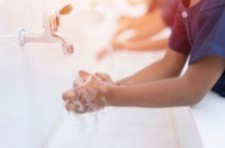Handwashing for parents and children
Why is handwashing so important?
Germs collect on our hands—when we open doors, wipe children’s faces, play with toys and change diapers. You can’t avoid germs, but you can reduce the chance of passing them to others by washing your hands often.
Washing your hands and your children’s hands is the best way to stop the spread of germs. Teach your children to cover their nose and mouth with tissues when they sneeze or cough, or to cough into their upper sleeve or elbow.
When should parents wash their hands?
Wash your hands before:
- preparing or eating food
- feeding your baby or child (including breastfeeding)
- giving medication to your child
- taking care of any sick friends or relatives
Wash your hands after:
- preparing food
- changing a diaper
- helping a child to use a toilet
- using a toilet yourself
- wiping or blowing your nose or your child’s nose
- taking care of a sick child
- treating a cut
- handling pets or animals or cleaning cages or litter boxes
- cleaning around the house
- handling garbage
When should children wash their hands?
It’s important to help young children to wash their hands to make sure it is done well.
Children should wash their hands before:
- eating or handling food
- playing in water
Children should wash their hands after:
- using the toilet
- playing outdoors, in the sand, or in water
- handling pets or animals
- sneezing or coughing into their hands or blowing their nose
- eating
- attending school or daycare
- spending time in high volume public places (e.g., indoor play structures, shopping malls, grocery stores, buses)
Four steps to proper handwashing
- Wet your hands under running water.
- Scrub your hands well with soap. Remember to scrub between your fingers, to wash both the front and back of your hands, and to clean under your fingernails.
- Washing your hands should take about 15 to 20 seconds – about the time it takes to sing “Happy Birthday”.
- Rinse your hands under running water.
- Dry your hands with a clean towel.
When water and soap are not available and hands are not visibly dirty, you can use pre-moistened hand wipes or alcohol-based hand sanitizers. Keep sanitizers out of the reach of children because they may be harmful if swallowed.
How should I wash my baby’s hands?
- Wash your baby’s hands with soap and a warm, wet, fresh towel (either paper or cloth).
- Rinse your baby’s hands with another fresh, warm, wet towel.
- Dry the hands well.
Is there anything else I should know about handwashing?
- Don’t use a single damp cloth to wash a group of children’s hands. Each child should get a clean cloth.
- Don’t use a standing basin of water (such as dirty dish water) to rinse hands.
- Don’t use sponges or non-disposable cleaning cloths unless you change them daily and clean them using detergent. Germs thrive on moist surfaces.
Additional resources
Reviewed by the following CPS committees
- Public Education Advisory Committee
Last updated: October 2022

